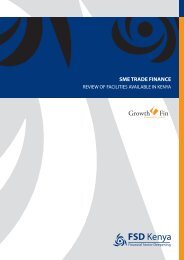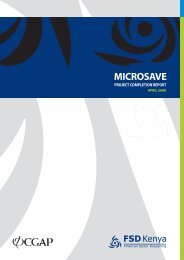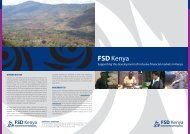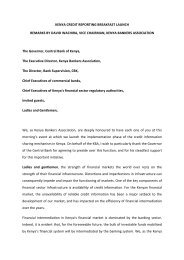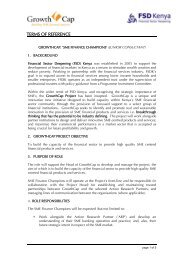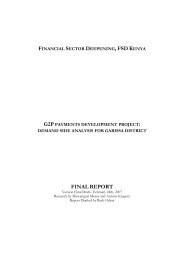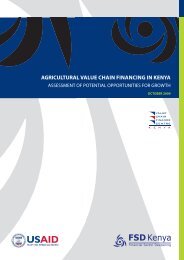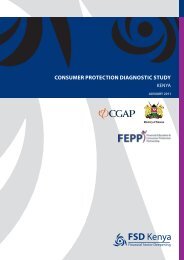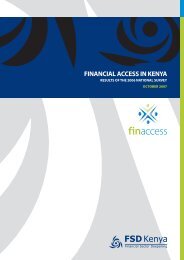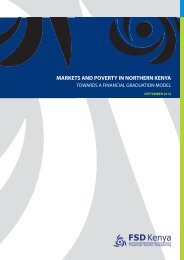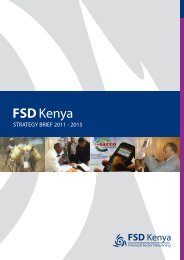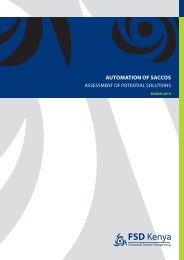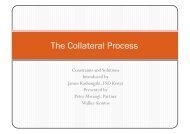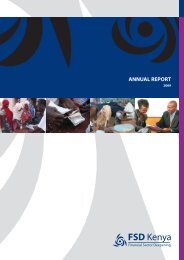fsd's financial education programme: evaluation and ... - FSD Kenya
fsd's financial education programme: evaluation and ... - FSD Kenya
fsd's financial education programme: evaluation and ... - FSD Kenya
Create successful ePaper yourself
Turn your PDF publications into a flip-book with our unique Google optimized e-Paper software.
2 • <strong>FSD</strong>’S FINANCIAL EDUCATION PROGRAMME: EVALUATION AND RECOMENDATIONS<br />
Chapter 2<br />
PROJECT OVERVIEW AND EVALUATION<br />
2.1 Project Design<br />
The <strong>FSD</strong> Financial Education (FinEd) <strong>programme</strong> began in December 2008.<br />
Within the <strong>FSD</strong>, <strong>financial</strong> capability resides under the Formal Financial theme,<br />
although there is also a ‘<strong>financial</strong> <strong>education</strong>’ component under the Direct<br />
Poverty theme. The team which runs the Knowledge Generation Theme is<br />
responsible for research to support <strong>financial</strong> <strong>education</strong> initiatives, <strong>and</strong> in<br />
particular, for developing a national baseline.<br />
The FinEd Project Appraisal report (PAR) indicates that the purpose of the<br />
FinEd <strong>programme</strong> was to ”lay the foundations for a comprehensive <strong>and</strong><br />
sustainable national <strong>programme</strong> of <strong>financial</strong> <strong>education</strong> in <strong>Kenya</strong>.” The vision<br />
of a <strong>financial</strong>ly literate <strong>Kenya</strong> is to make <strong>financial</strong> <strong>education</strong> available at all<br />
socio-economic levels. The objectives of the national <strong>programme</strong> were to:<br />
(i) improve <strong>Kenya</strong>ns’ <strong>financial</strong> management practices; (ii) foster effective use<br />
of <strong>financial</strong> services; <strong>and</strong> (iii) advance consumer protection in the <strong>financial</strong><br />
marketplace.<br />
The PAR recognised that realising the FinEd vision <strong>and</strong> achieving its objectives<br />
would require an enabling policy, a legal <strong>and</strong> regulatory framework <strong>and</strong> a<br />
multi-faceted approach to delivery. Three primary delivery channels were<br />
identified: (i) the formal <strong>education</strong>al system; (ii) mass media; <strong>and</strong> (iii) faceto-face<br />
interaction, which was to be sponsored by the <strong>financial</strong> sector itself.<br />
The intention was that the <strong>financial</strong> sector should exp<strong>and</strong> its outreach by<br />
partnering with other civil society organisations.<br />
The project had four outputs, each with several activities. These outputs were:<br />
1. Establishing a <strong>financial</strong> <strong>education</strong> partnership (FEP)<br />
2. Developing a preliminary national framework for <strong>financial</strong> <strong>education</strong><br />
3. Establishing a <strong>financial</strong> literacy baseline<br />
4. Piloting potentially viable approaches to <strong>financial</strong> <strong>education</strong><br />
In addition, a number of activities were added in the course of the <strong>programme</strong>.<br />
These included:<br />
5. A consumer protection diagnostic<br />
6. Training of public sector organisations to deliver <strong>financial</strong> <strong>education</strong><br />
7. Study into branchless banking <strong>and</strong> <strong>financial</strong> capability<br />
8. Creation of a <strong>financial</strong> <strong>education</strong> website<br />
9. Development of a <strong>financial</strong> <strong>education</strong> curriculum<br />
2.2 Project Implementation<br />
A dedicated Project Manager (PM) was appointed. The <strong>programme</strong> was<br />
intended to run until December 2010. The pilot projects were launched in<br />
2008 <strong>and</strong> were intended to run until 2010.<br />
The project was then extended to December 2011, to allow for completion<br />
of pilots, <strong>and</strong> then again to March 2012 to allow for completion of the pilot<br />
<strong>evaluation</strong>s.<br />
2.3 Financial Education <strong>and</strong> Protection Partnership<br />
(FEPP)<br />
2.3.1 Overview<br />
The Financial Education Partnership (FEP) was set up in 2008 with the<br />
intention of providing a neutral body which could coordinate <strong>financial</strong><br />
<strong>education</strong>-related activities in the private <strong>and</strong> public sector. Key responsibilities<br />
were: “to cultivate a vision for the <strong>programme</strong>, market <strong>financial</strong> <strong>education</strong> to<br />
stakeholders, research <strong>financial</strong> <strong>education</strong> resources, <strong>and</strong> define a policy<br />
agenda for consumer protection.” Its first goal was to agree a basic framework<br />
to guide the development of a national <strong>financial</strong> <strong>education</strong> <strong>programme</strong>.<br />
The FEP was later renamed as the Financial Education <strong>and</strong> Consumer Protection<br />
Partnership (FEPP). A task force was established to drive the FEPP <strong>and</strong> the <strong>FSD</strong><br />
provided secretarial services through the FinEd <strong>programme</strong>. The Governor of<br />
the Central Bank of <strong>Kenya</strong> became the “Champion” of FEPP. Initially there was<br />
much interest <strong>and</strong> membership soared further after the FEPP put out a call for<br />
proposals for FE pilots. However, once only four pilots were selected to receive<br />
support from the FinEd through the FEPP, some participants lost interest. Over<br />
time, the FEPP became more pilot-focussed <strong>and</strong> participation in the FEPP<br />
dwindled.<br />
A final FEPP Workshop was held in Naivasha in December 2010. This was<br />
well attended by several institutions <strong>and</strong> four working groups were formed:<br />
Consumer Education, Consumer Protection, Financial Education Policy,<br />
Research, Monitoring <strong>and</strong> Evaluation. No follow-up meeting was ever called<br />
as the Fin Ed <strong>programme</strong> was coming to an end in December 2011.<br />
However, during 2011, after FinEd was extended, the FinEd PM further evolved<br />
several of the concepts discussed at the last FEP workshop. These included a<br />
proposed national framework, consumer strategy <strong>and</strong> curriculum.<br />
Also, there were no further FEPP meetings after the Naivasha workshop<br />
at which to discuss or distribute these concepts, as no more funding was<br />
available.



